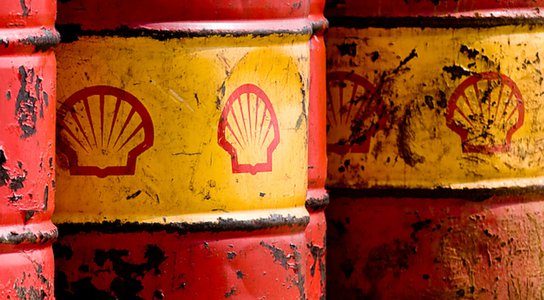A Global Witness investigation reveals that in 2023 the EU imported 130 million barrels of seaborne refined products – mostly diesel – from refineries processing Russian crude. These purchases were worth an estimated €1.1 billion to the Kremlin in direct tax revenues.
To put that number into perspective, it’s equal to NATO’s recent €1.1 billion contract to supply Ukraine with artillery as the country struggles to fend off Russia’s escalating attacks with dwindling supplies of ammunition. For the Kremlin, it’s enough money to purchase over 1,200 Kalibr cruise missiles or 60,000 Shahed drones, both of which have been used to bomb cities and kill civilians across Ukraine.
The fuel is entering through a not-so-small loophole left in EU sanctions which allows products refined from Russian oil to flow into the bloc. This has resulted in a ‘laundromat’ where refineries in countries like India and Turkey, can import discounted Russian crude, refine it into products like diesel, jet fuel, or gasoline, and legally sell the refined oil to embargoing jurisdictions like the EU.
Western sanctions were designed to restrict Kremlin revenues derived through Russia’s sprawling fossil fuel industry. Yet the refining loophole undermines this objective by helping to keep demand for Russian oil high, and it’s not only European sanctions that are fuelling the problem.
Russian fuel is also making its way into the UK and the US through the same refining loophole. In August Global Witness reported that 1 in every 20 UK flights ran on jet fuel made from Russian oil, and in November we found that the US had imported 30 million barrels of fuel from refineries that import Russian oil.
By tracking seaborne flows of crude from Russia to refineries around the world and then on to the European ports, we can now show that in 2023, an estimated 35 million barrels of Russian oil entered the EU in the form of refined petroleum products. While it is impossible to track specific molecules, we can analyse the relative volume of Russian vs. non-Russian oil used in a refinery’s feedstock, where data is available. The refineries we identified that export such products to the EU, used between 20% and 90% Russian oil in their feedstocks, allowing us to estimate that 35 million out of the total 130 million barrels entering EU ports were derived directly from Russian crude oil.
In Russia, the production and export of crude oil was taxed through the Mineral Extraction Tax and Export Duty*. Specific tax rates vary due to a complex system of tax exemptions and subsidies, making it difficult to estimate the exact revenue collected by the Kremlin for each barrel. The Russian crude oil that can be attributed to EU seaborne imports was worth between €870 million to €1.3 billion to the Kremlin in tax revenues. These are the lower and upper bounds in tax value, equivalent to the oil being subject to either all tax breaks or no tax breaks. We estimate that the tax value is likely to be somewhere in the middle of this range – around €1.1 billion.
This figure should bring into sharp focus the reality of leaving the refining loophole open. By allowing imports of laundered Russian fuel, the EU is providing enough revenue to the Kremlin to sustain this brutal conflict. If the EU wants to get serious about helping Ukraine and protecting its own frontiers, leaders in Brussels should sever ties to supply chains that are helping the Kremlin pay for shells, rockets, and drones aimed at Ukraine.
The companies at the heart of the trade
There are only a handful of companies at the heart of this loophole. The refineries that are processing Russian crude oil and exporting to the EU are largely the same ones sending laundered Russian fuel to the UK and US. These seven refineries collectively processed 390 million barrels of Russian crude oil in 2023, valued at an estimated €23 billion. By ensuring sustained demand for Russian oil, they are acting as a crucial lifeline to fill the Kremlin’s coffers.
The Vadinar Refinery, India’s second largest, stands out as a significant asset to the Kremlin. Operated by Nayara Energy, which is 49% owned by Russia’s premier state oil company Roseneft, Vadinar received 82 million barrels of Russian crude in 2023, worth an estimated €5 billion. According to data from Kpler**, a commodity analytics platform, the refinery had not received any Russian crude oil for over a year prior to Russia’s full-scale invasion of Ukraine. However, immediately after Russian tanks entered Ukraine in 2022, Vadinar’s imports of Russian crude shot up, and through 2023 accounted for 57% of the refinery’s total feedstocks.
Demand for Russian crude oil among exporters to the EU appears likely to continue unabated. The Azeri-state owned STAR refinery in Turkey recently concluded a deal with Russian oil company Lukoil to receive 200,000 barrels of Russian crude per day. In 2023, STAR refinery was a major player in the EU market, delivering 23 million barrels of refined products.

Satellite image of STAR Refinery and Tupras Aliaga Izmir Refinery taken on 26 January 2024 - a day when vessels carrying crude oil from Russia were docked at both refineries
Image © 2024 Planet Labs PBC
It’s not just the refineries themselves that enable this loophole. The fossil fuel majors of Europe appear to be purchasing shipments from refineries which import Russian crude. Kpler data lists BP, Shell, TotalEnergies, ENI, and OMV as potential buyers of products from refineries identified as part of this loophole by Global Witness. European commodity trading firms Vitol, Glencore, Trafigura and Gunvor also appear as potential buyers.
We are not accusing these companies of any legal wrongdoing. However, the trade demonstrates a gaping legal loophole that has generated hundreds of millions in revenue for the Kremlin and allows laundered Russian fuel products to flow freely into countries which claim to be taking a hard stance against Russia’s war on Ukraine.
Closing the loophole
While we should celebrate that the EU has just signed a landmark aid package for Ukraine, the power of such aid is diminished if hundreds of millions of euros also flow from the EU to the Kremlin, indirectly through the refining loophole. The EU’s top diplomat, Josep Borrell already identified this as an issue early last year when he referred to it as a ‘circumvention of sanctions’.
The EU must end the flow of fossil fuel money to the Russian state by closing the refining loophole in sanctions. Representatives in the United States Congress have already begun to do this by introducing legislation that would ban imports of fuels to the US from refineries which process Russian crude oil. The EU should follow suit with a similar ban, to stop the flow of laundered Russian oil to European markets and uphold the EU’s commitment to unwavering support or Ukrainian sovereignty.
A spokesperson for TotalEnergies told Global Witness “TotalEnergies acts lawfully in the framework of the energy policy and sanctions’ policy defined by the European Union authorities and member States.”
A spokesperson for ENI replied that “Eni stopped trading Russian origin cargoes even prior to the EU/UK sanction regime officially coming into force and strictly complies with all applicable sanctions...”
An OMV spokesperson replied “OMV complies with sanctions and the law at all times and has done so with regards to restrictions covering Russian crude oil and certain refined petroleum products.”
Shell responded to Global Witness by referring to an FAQ which states that “in full compliance with sanctions, other refinery-operating companies in third countries may continue to import Russian crude in order to transform it into a range of products that various communities need. Also in full compliance with sanctions and aligned with government guidance, Shell does not currently exclude purchasing products that have been refined from Russian crude by third parties in such countries.”
A Trafigura spokesperson replied “Trafigura terminated its long-term offtake contracts for crude oil and petroleum products with state-owned Russian producers in advance of European sanctions coming into effect in May 2022. Since then, we have not purchased Russian origin crude oil. We continue to comply with applicable sanctions.”
A Vitol spokesperson replied “There is no ‘loophole’ in the sanctions. The authorities are aware that such products are widely traded and they trade at normal market prices, which not be the case if there were not widespread market acceptance of such products… Your use of the term ‘laundering’ is also inaccurate and misleading. 1) It is not illegal for Russia to produce the oil nor for these refineries to purchase Russian crude oil 2) in law, once the crude oil has been refined it is no longer Russian origin. As there is no illegal activity (as you recognise) the refining of Russian crude oil cannot accurately be described as ‘laundering’.”
Glencore responded by referring us to their statement regarding the war in Ukraine and a statement on the completion of review of their Russian business activities.
Gunvor responded to Global Witness “We disagree with your assessment that there is a ‘loophole’, a characterization which insinuates that the situation is unintentional and being exploited. Relevant governments, including the U.S. and EU, have made it clear that this is by design to ensure the global flow of refined products is uninterrupted. To ban refined products from exporting refiners that process Russian crude as feedstock would lead to severe shortages in Europe...”
When contacted by Global Witness, BP, Vadinar Refinery (Nayara Energy), STAR Refinery, Tupras Izmit Refinery, Tupras Aliaga Izmir Refinery, Jamnagar Refinery, New Mangalore Refinery, and Burgas Refinery all declined to comment.
*Since the beginning of 2024, the Export Duty rate has been reduced to 0, however this taxation was relevant throughout 2023.
**Kpler is a data analytics provider that tracks the seaborne flows of commodities around the world.


